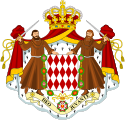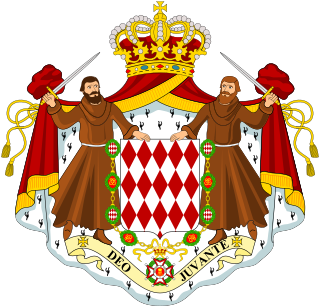 |
|---|
General elections were held in Monaco on 19 May 1918 to elect the 12 members of the National Council. The national councilmen were elected by a 30-member Electoral College.
 |
|---|
General elections were held in Monaco on 19 May 1918 to elect the 12 members of the National Council. The national councilmen were elected by a 30-member Electoral College.
The 30-member Electoral College consisted of nine members elected by the Communal Council and 21 members elected by voters. It also had substitute members elected by the Communal Council and six substitute members elected by voters.
The Communal Council held an election for nine members and three substitute members of the Electoral College on 28 April 1918. Théophile Gastaud and César Settimo declined to accept the nomination as members of the Electoral College. César Settimo was elected as substitute members.
| Candidates | Votes | |
|---|---|---|
| Members | Joseph Olivié | 14 |
| Suffren Reymond | 13 | |
| Louis Aureglia | 13 | |
| Honoré Bellando | 13 | |
| Antoine Marsan | 10 | |
| Alexandre Médecin | 9 | |
| Henri Marquet | 8 | |
| Michel Fontana | 8 | |
| Séraphin Olivié | 8 | |
| Théophile Gastaud | 8 | |
| César Settimo | 8 | |
| Substitute members | César Settimo | 9 |
| Paul Bergeaud | 9 | |
| Pierre Jioffredy | 8 | |
| Voters | 15 | |
| Registered voters | 15 | |
| Source: [1] | ||
An election of the remaining 21 Electoral College members and six substitute members was held on 28 April 1918.
| Candidates | Votes | |
|---|---|---|
| Members | Fulbert Aureglia | 485 |
| Adolphe Blanchy | 476 | |
| Eugène Marquet | 473 | |
| Jean Bonafède | 471 | |
| Louis Médecin | 471 | |
| Etienne Vatrican | 471 | |
| Louis Bellando de Castro | 469 | |
| Paul Cioco | 461 | |
| Louis Néri | 461 | |
| Henri Olivié | 458 | |
| Louis Rapaire | 456 | |
| Joseph Crovetto | 454 | |
| Maurice Gastaldi | 444 | |
| Second Armita | 443 | |
| Edouard Giordano | 439 | |
| Jean Marsan | 438 | |
| Clément Ciais | 435 | |
| François Fontana | 432 | |
| Eugène Marquet Jr. | 430 | |
| Joseph Raimbert | 430 | |
| Joseph Lorenzi | 408 | |
| Substitute members | Albert Scotto | 467 |
| Charles Mullot | 429 | |
| Joseph Bonafède | 425 | |
| Henri Bergeaud | 423 | |
| Baptistin Gastaud | 420 | |
| Célestin Allavena | 406 | |
| Valid ballots | 495 | |
| Invalid ballots | 2 | |
| Total ballots | 497 | |
| Registered voters | 627 | |
| Source: [1] | ||
| Candidates | Votes |
|---|---|
| Suffren Reymond | 30 |
| Louis Aureglia | 29 |
| Maurice Gastaldi | 28 |
| Louis de Castro | 27 |
| Jean Marsan | 27 |
| Henri Marquet | 27 |
| Paul Cioco | 26 |
| Alexandre Médecin | 26 |
| Eugène Marquet | 24 |
| François Médecin | 24 |
| Paul Marquet | 19 |
| Louis Neri | 18 |
| Théophile Gastaud | 13 |
| Michel Fontana | 10 |
| Séraphin Olivié | 7 |
| Joseph Olivié | 6 |
| Antoine Marsan | 2 |
| Honoré Bellando | 1 |
| Adolphe Blanchy | 1 |
| Charles Bernasconi | 1 |
| Pierre Jioffredy | 1 |
| Source: [2] | |

Suffrage, political franchise, or simply franchise is the right to vote in public, political elections and referendums. In some languages, and occasionally in English, the right to vote is called active suffrage, as distinct from passive suffrage, which is the right to stand for election. The combination of active and passive suffrage is sometimes called full suffrage.

Since becoming independent of the United Kingdom in 1970, Fiji has had four constitutions, and the voting system has changed accordingly.

Elections in Venezuela are held at a national level for the President of Venezuela as head of state and head of government, and for a unicameral legislature. The President of Venezuela is elected for a six-year term by direct election plurality voting, and is eligible for re-election. The National Assembly (Asamblea Nacional) has 165 members (diputados), elected for five-year terms using a mixed-member majoritarian representation system. Elections also take place at state level and local level.

Elections in Botswana take place within the framework of a multi-party democracy and a parliamentary system. The National Assembly is mostly directly elected, and in turn elects the President and some of its own members. The Ntlo ya Dikgosi is a mixture of appointed, hereditary and indirectly elected members.

Elections in Gabon take place within the framework of a presidential multi-party democracy with the Gabonese Democratic Party, in power since independence, as the dominant party. The President and National Assembly are directly elected, whilst the Senate is indirectly elected.

Elections in Guyana take place within the framework of a multi-party representative democracy and a presidential system. The National Assembly is directly elected, with the nominee of the party or alliance that receives the most votes becoming President.
Elections in Luxembourg are held to determine the political composition of the representative institutions of the Grand Duchy of Luxembourg. Luxembourg is a liberal representative democracy, with universal suffrage guaranteed under its constitution. Elections are held regularly, and are considered to be fair and free.

Elections in Togo take place within the framework of a presidential system. Both the President and the National Assembly are directly elected by voters. Togo is a one party dominant state with the Union for the Republic in power.

National constituencies were a former feature of the Fijian electoral system. They were created as a compromise between demands for universal suffrage on a common voters' roll, and for a strictly communal franchise, with Parliamentary constituencies allocated on an ethnic basis and elected only by voters enrolled as members of specific ethnic groups.
National University of Ireland (NUI) is a university constituency in Ireland, which elects three senators to Seanad Éireann. Its electorate is the graduates of the university, which has a number of constituent universities. It previously elected members to the House of Commons of the United Kingdom (1918–1921), to the House of Commons of Southern Ireland (1921) and to Dáil Éireann (1918–1936).

Senators in France are elected by indirect universal suffrage, by a panel of "electors". Half of the Senate seats are up for election every three years; the term of office is six years.
Parliamentary elections were held in the United Arab Emirates on 3 October 2015 to elect 20 of the 40 members of the Federal National Council. The elections took place through an electoral college, which was expanded from 129,274 members in the 2011 elections to 224,279 for the 2015 elections.
The 1991 Monegasque municipal elections were held on 10 and 17 February to elect the 15 members of the Communal Council of Monaco.

General elections were held in Monaco on 23 April 1911 to elect the 21 members of the National Council. A total of 20 candidates participated in the election. Out of the 629 registered voters, 524 voters cast their ballots.

General election were held in Monaco on 16 June 1929 to elect the 12 members of the National Council. The national councilmen were elected by a 30-member Electoral College.

General elections were held in Monaco on 16 July 1933 to elect the 12 members of the National Council. The national councilmen were elected by a 30-member Electoral College.

General election were held in Monaco on 8 May 1921 to elect five members of the National Council. The national councilmen were elected by a 30-member Electoral College.

General election were held in Monaco on 21 May 1922 to elect 12 members of the National Council. The national councilmen were elected by a 30-member Electoral College.

General election were held in Monaco on 18 April 1926 to elect 12 members of the National Council. The national councilmen were elected by a 30-member Electoral College.

General election were held in Monaco on 4 July 1937 to elect five members of the National Council. The national councilmen were elected by a 30-member Electoral College.